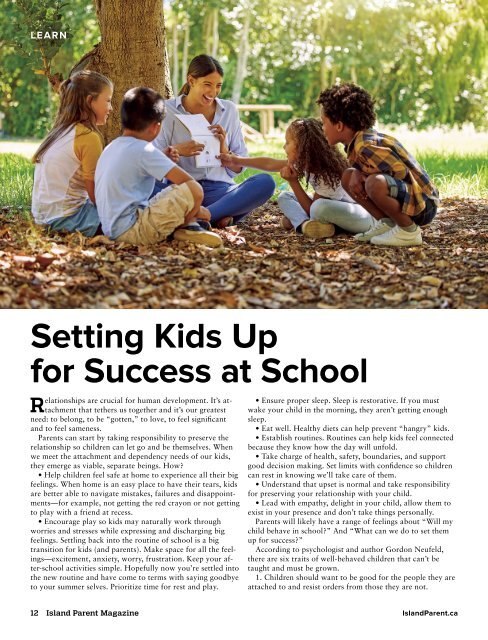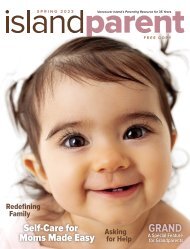Island Parent Fall 2023
Vancouver Island’s Parenting Resource for 35 Years: Out & About in Nature: Rain or Shine • The Cool of Volunteering at School • Lessons from a Little Kid • Setting Kids Up for Success at School • Be Gentle with Yourself • Tweens & Teens
Vancouver Island’s Parenting Resource for 35 Years: Out & About in Nature: Rain or Shine • The Cool of Volunteering at School • Lessons from a Little Kid • Setting Kids Up for Success at School • Be Gentle with Yourself • Tweens & Teens
You also want an ePaper? Increase the reach of your titles
YUMPU automatically turns print PDFs into web optimized ePapers that Google loves.
LEARN<br />
Setting Kids Up<br />
for Success at School<br />
Relationships are crucial for human development. It’s attachment<br />
that tethers us together and it’s our greatest<br />
need: to belong, to be “gotten,” to love, to feel significant<br />
and to feel sameness.<br />
<strong>Parent</strong>s can start by taking responsibility to preserve the<br />
relationship so children can let go and be themselves. When<br />
we meet the attachment and dependency needs of our kids,<br />
they emerge as viable, separate beings. How?<br />
• Help children feel safe at home to experience all their big<br />
feelings. When home is an easy place to have their tears, kids<br />
are better able to navigate mistakes, failures and disappointments—for<br />
example, not getting the red crayon or not getting<br />
to play with a friend at recess.<br />
• Encourage play so kids may naturally work through<br />
worries and stresses while expressing and discharging big<br />
feelings. Settling back into the routine of school is a big<br />
transition for kids (and parents). Make space for all the feelings—excitement,<br />
anxiety, worry, frustration. Keep your after-school<br />
activities simple. Hopefully now you’re settled into<br />
the new routine and have come to terms with saying goodbye<br />
to your summer selves. Prioritize time for rest and play.<br />
• Ensure proper sleep. Sleep is restorative. If you must<br />
wake your child in the morning, they aren’t getting enough<br />
sleep.<br />
• Eat well. Healthy diets can help prevent “hangry” kids.<br />
• Establish routines. Routines can help kids feel connected<br />
because they know how the day will unfold.<br />
• Take charge of health, safety, boundaries, and support<br />
good decision making. Set limits with confidence so children<br />
can rest in knowing we’ll take care of them.<br />
• Understand that upset is normal and take responsibility<br />
for preserving your relationship with your child.<br />
• Lead with empathy, delight in your child, allow them to<br />
exist in your presence and don’t take things personally.<br />
<strong>Parent</strong>s will likely have a range of feelings about “Will my<br />
child behave in school?” And “What can we do to set them<br />
up for success?”<br />
According to psychologist and author Gordon Neufeld,<br />
there are six traits of well-behaved children that can’t be<br />
taught and must be grown.<br />
1. Children should want to be good for the people they are<br />
attached to and resist orders from those they are not.<br />
12 <strong>Island</strong> <strong>Parent</strong> Magazine <strong>Island</strong><strong>Parent</strong>.ca
















